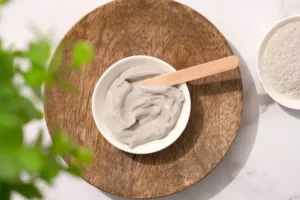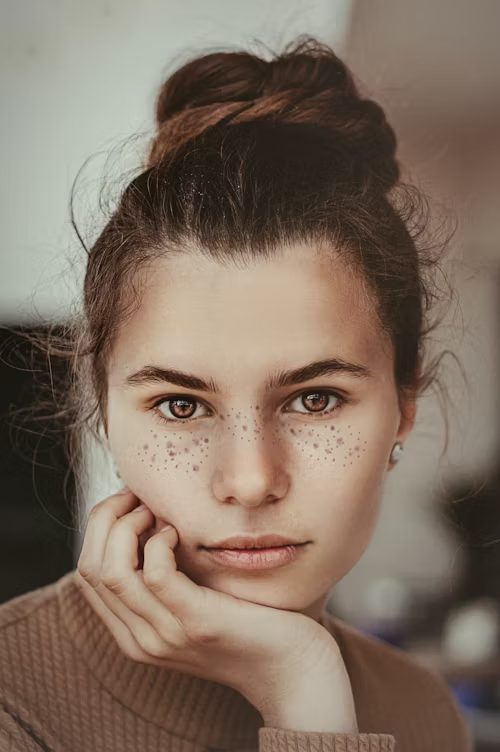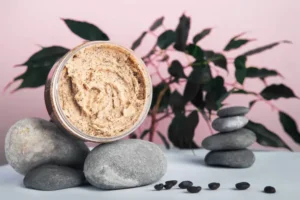Best dark spot remover for a face?
Dark spots on the face are one of the most common skin concerns. Whether they’re the result of acne scars, excessive sun exposure, or hormonal changes, dark spots can significantly affect the complexion, making the skin tone uneven and less radiant.
While these spots are typically harmless, they can have a significant impact on one’s confidence and appearance. Fortunately, there are many treatments available to lighten and fade dark spots, from over-the-counter products to more advanced procedures like laser therapy.
we’ll explore some of the best dark spot removers, ranging from highly effective serums to natural remedies, and provide helpful information on how to choose the right treatment for your skin type.
By the end of this guide, you’ll have a better understanding of how to address hyperpigmentation and achieve a more even, glowing complexion.
What Are Dark Spots?
Before diving into treatments, it’s essential to understand what dark spots are and why they appear. Dark spots, also known as hyperpigmentation, occur when excess melanin (the pigment responsible for skin color) is produced in localized areas of the skin. Best dark spot remover for a face?
These spots often appear darker than the surrounding skin, and they can vary in size, shape, and color.
Types of Dark Spots:
- Sunspots (Age Spots): Often caused by prolonged exposure to UV rays.
- Post-Inflammatory Hyperpigmentation (PIH): These spots are typically the result of skin trauma like acne, cuts, or burns.
- Melasma: Hormonal changes, often during pregnancy or due to birth control, can cause dark patches on the face, particularly on the forehead, cheeks, and upper lip.
- Freckles: These are small, brown spots that tend to appear in areas that are regularly exposed to the sun.
What Causes Dark Spots?
- Sun Exposure: UV rays trigger the production of melanin as a protective response, leading to sunspots.
- Acne: Picking or squeezing acne can cause inflammation, which often results in PIH after the acne heals.
- Hormonal Imbalances: Pregnancy, birth control, or hormone therapy can cause melasma.
- Aging: As we age, our skin’s ability to repair itself declines, and sun damage over the years becomes more apparent in the form of dark spots.
- Genetics: Some people are more prone to developing dark spots due to their genetic predisposition.
How Do Dark Spot Removers Work?
Dark spot removers work in various ways to reduce pigmentation, lighten dark spots, and restore an even skin tone. The most effective treatments contain ingredients that either reduce melanin production or encourage the shedding of hyperpigmented skin cells.
Common Ingredients in Dark Spot Removers:
- Vitamin C: An antioxidant that brightens the skin and inhibits melanin production.
- Niacinamide (Vitamin B3): Known for its ability to fade dark spots and improve overall skin texture.
- Hydroquinone: A skin-lightening agent that blocks the production of melanin.
- Alpha Hydroxy Acids (AHAs): Exfoliating acids that help slough off dead skin cells and reveal fresher, brighter skin.
- Retinoids: Help increase skin cell turnover and fade discoloration.
- Licorice Extract: A natural skin lightener that reduces the appearance of dark spots.
- Arbutin: A naturally derived compound that inhibits melanin production.
When choosing the right product for your skin, you’ll want to consider these ingredients and determine which is best suited to your skin type and the type of dark spots you’re dealing with.
Top Dark Spot Removers for the Face
Here’s a breakdown of some of the most effective dark spot removers available today. Whether you’re looking for a serum, cream, or exfoliant, there’s something for everyone.
Best Vitamin C Serums for Dark Spots
Vitamin C is one of the most popular ingredients for fading dark spots, as it helps reduce melanin production and brightens the skin. It also offers antioxidant benefits that protect the skin from free radical damage caused by environmental factors like pollution and UV rays.
Top Vitamin C Serums:
SkinCeuticals C E Ferulic
This is one of the gold standards in Vitamin C serums. It combines 15% pure Vitamin C (ascorbic acid) with vitamin E and ferulic acid to enhance its antioxidant power. It is known for its ability to reduce dark spots and protect against future skin damage.
Obagi Professional-C Serum 20%
With 20% Vitamin C, this potent serum helps to diminish the appearance of dark spots and hyperpigmentation while improving skin texture and radiance. It’s great for people with more stubborn pigmentation issues.
La Roche-Posay Pure Vitamin C Face Serum
This serum combines 10% pure Vitamin C with salicylic acid to exfoliate and brighten the skin, effectively addressing dark spots and promoting an even skin tone.
Best Niacinamide-based Treatments
Niacinamide is a powerful anti-inflammatory ingredient that helps to lighten dark spots by inhibiting melanin production. It also improves the skin’s barrier function and reduces redness.
Top Niacinamide Serums:
The Ordinary Niacinamide 10% + Zinc 1%
This affordable serum has a high concentration of niacinamide, which helps reduce the appearance of dark spots, control oil production, and minimize redness and inflammation.
Paula’s Choice 10% Niacinamide Booster
This booster helps target discoloration, strengthen the skin’s barrier, and improve the overall appearance of the skin, especially for those dealing with acne scars and dark spots.
Murad Rapid Age Spot and Pigment Lightening Serum
This serum is ideal for those with stubborn dark spots, as it contains both niacinamide and hydroquinone, a potent skin-lightening agent.
Best Hydroquinone Creams for Dark Spots
Hydroquinone is a prescription-strength skin-lightening agent that blocks the enzyme responsible for melanin production. It is highly effective for reducing the appearance of dark spots but should be used with caution and in moderation.
Top Hydroquinone Products:
Ambi Skincare Fade Cream
This affordable hydroquinone cream is often recommended for people with hyperpigmentation due to sun exposure and is known to deliver noticeable results with consistent use.
Tri-Luma Cream
A prescription treatment that combines hydroquinone, tretinoin (a retinoid), and fluocinolone acetonide (a mild steroid), this cream helps to reduce dark spots and improve skin texture over time.
Murad Rapid Age Spot and Pigment Lightening Serum
This serum contains 2% hydroquinone along with other ingredients like glycolic acid to enhance its ability to fade dark spots.
Best Retinol and Retinoid-based Treatments
Retinoids help increase skin cell turnover, which helps fade dark spots and promotes a smoother, more even skin tone. These products are especially helpful for those with both acne scars and aging-related pigmentation.
Top Retinol Products:
Differin Adapalene Gel 0.1% Acne Treatment
This over-the-counter retinoid gel is effective for both preventing acne and treating dark spots. It’s gentle enough for most skin types and is great for improving skin texture. Best dark spot remover for a face?
The Ordinary Retinol 0.5% in Squalane
This affordable option from The Ordinary offers retinol to promote cell turnover and reduce the appearance of dark spots and fine lines.
Retin-A (Tretinoin)
A prescription-strength retinoid that is highly effective for fading dark spots and improving overall skin texture. It is considered one of the most potent treatments for hyperpigmentation.
Best AHA-based Exfoliants

Alpha Hydroxy Acids (AHAs) like glycolic acid and lactic acid are great exfoliants that help to slough off dead skin cells and reveal brighter, more even skin. These acids also promote collagen production and can gradually fade dark spots.
Top AHA Exfoliants:
Alpha-H Liquid Gold
A cult favorite that contains glycolic acid to exfoliate and reduce the appearance of pigmentation.
Dr. Dennis Gross Alpha Beta Universal Daily Peel
These peel pads combine AHAs and BHAs to exfoliate the skin, reduce dark spots, and enhance radiance.
Pixi Glow Tonic
A gentle toner with 5% glycolic acid that helps improve skin texture and fade dark spots over time.
How Long Does It Take to See Results?
The timeline for seeing results depends on several factors, including the severity of the dark spots, the product used, and how consistently you use it. In general, you may start noticing improvements in skin tone and texture after about 4 to 6 weeks of consistent use, though more stubborn spots may take 3-6 months to show noticeable improvement. Best dark spot remover for a face?
Conclusion
Dark spots can be frustrating, but they’re not permanent. With the proper treatment, lifestyle changes, and consistent use of effective products, you can significantly lighten your dark spots and restore an even complexion. Whether you choose a Vitamin C serum, a retinoid, or a natural remedy,
remember that consistency is key. Always use sunscreen daily to protect your skin from further sun damage, and don’t hesitate to consult a dermatologist for personalized advice. Best dark spot remover for a face?
FAQs
Can dark spots be completely removed?
While dark spots can be significantly lightened and reduced with the right treatments, complete removal is not always guaranteed. However, with consistent care, many people see remarkable improvements.
Are natural remedies effective for treating dark spots?
Natural remedies like aloe vera, turmeric, and lemon juice may provide mild improvement for lighter spots, but they generally aren’t as potent as scientifically formulated treatments like Vitamin C or hydroquinone.
How do I prevent dark spots from coming back?
Use broad-spectrum sunscreen daily (SPF 30 or higher), avoid excessive sun exposure, and maintain a regular skincare routine with brightening ingredients.
Should I use these products in the morning or at night?
Most dark spot treatments like retinoids and AHAs are best used at night, while Vitamin C should be used in the morning, followed by sunscreen.
Can pregnancy cause dark spots?
Yes, hormonal changes during pregnancy can lead to melasma, a type of hyperpigmentation that typically appears as dark patches on the face.


